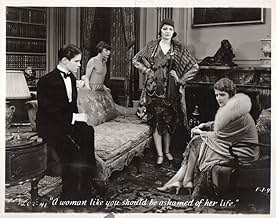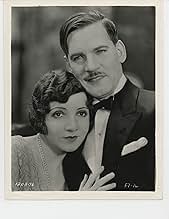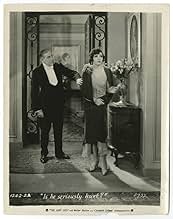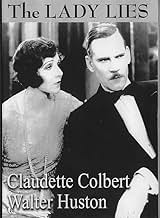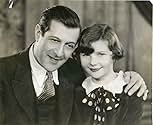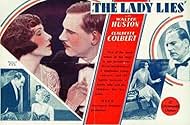Ajouter une intrigue dans votre langueMuch to the disapproval of his snooty children, a wealthy widowed attorney takes up with a beautiful but "lower-class" woman.Much to the disapproval of his snooty children, a wealthy widowed attorney takes up with a beautiful but "lower-class" woman.Much to the disapproval of his snooty children, a wealthy widowed attorney takes up with a beautiful but "lower-class" woman.
- Réalisation
- Scénario
- Casting principal
- Récompenses
- 3 victoires au total
Avis à la une
Becoming aware of their father's affair, teenage children Tom Brown (as Robert "Bob" Rossiter Jr.) and Patricia Deering (as Josephine "Jo" Rossiter) decide to meet Colbert, who shares a New York apartment with Huston. Young Mr. Brown telephones Colbert with dire health news. To turn the tables on the tricky kids, Colbert tells them she and Huston's upcoming trip to Europe is also going to be a honeymoon. But, it's just a cruise. This is how "The Lady Lies" gets its title. The film is probably most interesting as a chance to see the then stage actress Claudette Colbert in an early starring appearance (showing plenty of profile).
**** The Lady Lies (9/21/29) Hobart Henley ~ Walter Huston, Claudette Colbert, Tom Brown, Charles Ruggles
Huston certainly hit the ground running in the movies in 1929. Besides this movie and THE VIRGINIAN -- I've yet to see GENTLEMEN OF THE PRESS -- he also appeared in three shorts, one as Jean Valjean and one as Abraham Lincoln! In this movie he gives the most naturalistic performance in an early talkie I have ever seen. The opening scene has him trying to get some paperwork done while Charles Ruggles natters on; Huston's distracted, muttered replies are pitch perfect.
The story, despite its rather standard plot, has some fine situations, and director Hobart Henley takes advantage of the superior sound technicians in Paramount's Astoria studio to produce a lovely scene in a restaurant. It's shot wild, letting the camera move freely, while the soundtrack is filled with the babble of a large room's conversations. Henley had entered the movies in 1914 as an actor, and soon became a successful director. He retired from the screen in 1934, even though he was only 47; he lived another 30 years. Like many a now-obscure director, I have no idea why he quit so young.
This was made just a few months after Walter Huston's debut film, GENTLEMEN OF THE PRESS but in terms of filmmaking its light years ahead. Compared with that earlier 'talker' this feels like it's made by professionals. It's no great classic but it's pretty good. In this Walter Huston (who was pretty awful in GOTP but now knows exactly how to act in a talking picture) plays an upper class widow who takes a shopgirl as his lover. Even though she is Claudette Colbert, not exactly your typical working class girl, that such a relationship could be anything more than a sugar daddy - gold digger situation is considered outrageous not just by his friends and snooty family but by her friends as well.
Without revealing the plot, even Huston's and Colbert's characters consider it impossible that they could possibly be in love and certainly contemplating marriage would be about as likely as moving to the moon. I was surprised just how rigid the social structure was portrayed to be in America - it seemed as bad as ours here in England. A couple of years later however their social structure would change forever when The Depression would put people of all classes in the same boat. Whereas the 30s seems like a different world, the 20s were a different universe.
The story is probably a little bit too removed from our lives to be that accessible to most of us today but certainly for 1929, it's remarkably well made (it's even got a musical score) so it's very watchable and entertaining. If you're interested in life in the 1920s, think that Walter Huston should have been President of the world or you're in love with Claudette Colbert, you will enjoy this.
As to the title of this review - As all good Genesis fans will know, The Lady Lies is the best track on their 1978 album, And Then There Were Three.
Le saviez-vous
- AnecdotesOne of the earliest of over 700 Paramount Productions, filmed between 1929 and 1949, which were sold to MCA/Universal in 1958 for television distribution, and have been owned and controlled by MCA ever since; its earliest documented telecast took place in Charlotte NC Monday 2 May 1960 on WSOC (Channel 9).
- Citations
Charlie Tayler: Now, Hilda, you'll tell me the reason for getting me up in the middle of the night to come and have breakfast with you like this.
Hilda Pearson: Oh, Daddy, I have sad news for you.
Charlie Tayler: Oh, my goodness! What has Papa's little rustle of spring got to tell Papa?
Hilda Pearson: You lost four thousand dollars on the market today.
Charlie Tayler: Did you get me out of a nice warm bed to tell me that? How did this thing happen?
Hilda Pearson: Well, I switched my account over to your brokers. I thought it would be kind of clubby. You know, your account and mine right next to each other.
Charlie Tayler: Oh, that would be cosy and comfy wouldn't it? In other words, you mean that you're four thousand dollars short at my broker?
Hilda Pearson: Yes, and if four grand aren't there by the time the market closes, they'll sell your baby right out. You wouldn't want that to happen, would you, Daddy?
Charlie Tayler: Oh, no. Mamma knows Daddy wouldn't want that to happen. Tell me something, did you look me up in Bradstreet?
Hilda Pearson: You bet your life I did.
Charlie Tayler: And you found there was gold in them thar hills?
Hilda Pearson: Oh, Daddy...!
Charlie Tayler: Well do me a favour, don't try to get it all in one blad, will you?
- ConnexionsAlternate-language version of Une femme a menti (1930)
Meilleurs choix
Détails
- Durée1 heure 15 minutes
- Couleur
- Rapport de forme
- 1.20 : 1
Contribuer à cette page


